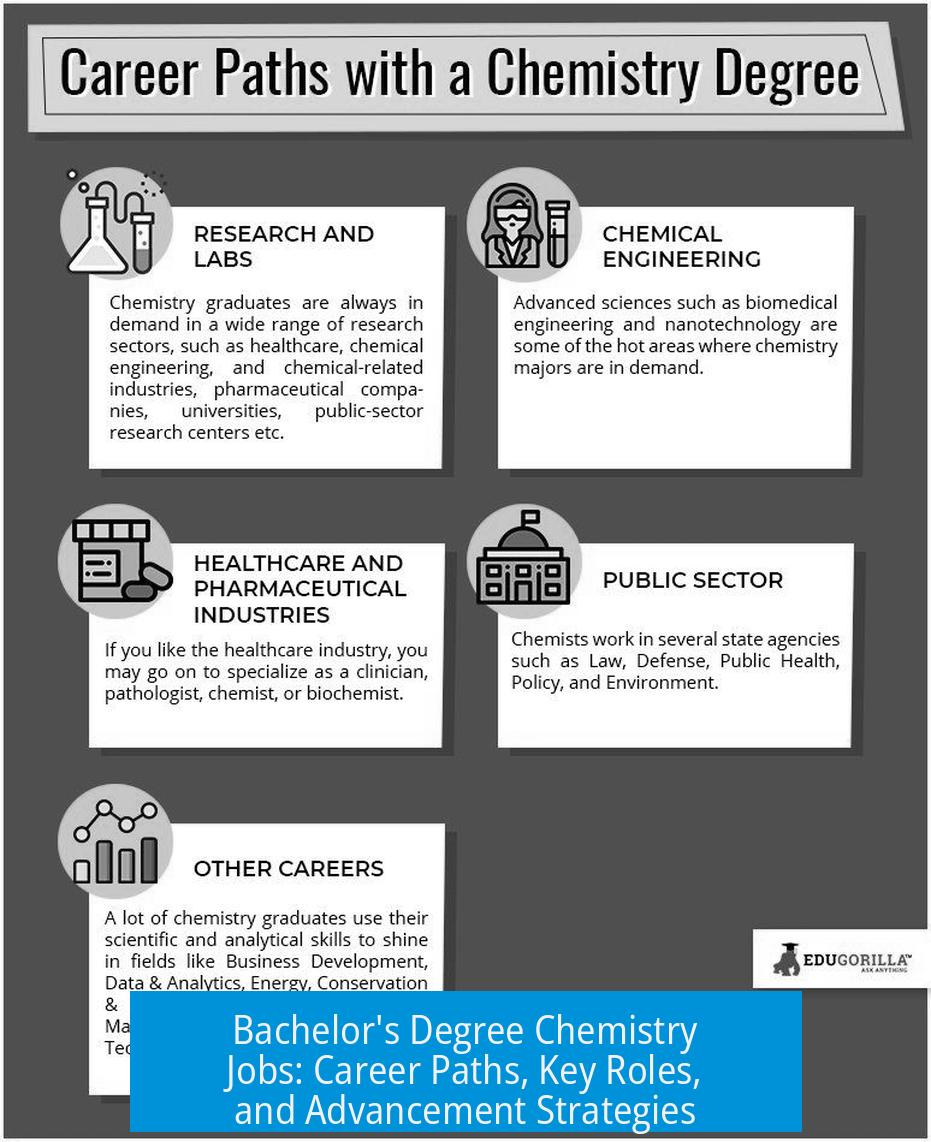Bachelor’s Degree Chemistry Jobs: Exploring Career Paths and Opportunities

Bachelor’s degree holders in chemistry can access diverse job roles primarily in lab technician, quality assurance, environmental monitoring, and public health sectors without immediately pursuing advanced degrees.
Research vs Technician Roles
Graduates with a chemistry bachelor’s typically qualify for lab technician roles. These jobs involve performing routine tests and handling chemical analyses under supervision.
Advanced research positions generally require a master’s or doctoral degree. These roles feature designing experiments, analyzing data, and publishing findings.
For first-time entrants, technician roles provide hands-on lab experience essential for understanding laboratory protocols and safety.
Lab Experience and In-Job Training
Laboratories vary greatly in methods and tests conducted. Employing companies plan to offer job-specific training regardless of a candidate’s background.
Many new hires start by focusing on a single analytical procedure. For example, performing Karl Fischer titration to measure water content in oils. Over time, responsibilities expand to a broader scope of analyses.
This incremental learning allows graduates to develop proficiency in technical skills while adapting to workplace requirements.
Impact of Geography and Industry Focus
Job availability often depends on geographic location and dominant industries in the region.
- Oil and gas hubs like Aberdeen provide technician and quality assurance roles in petrochemical labs.
- Academic institutions such as Cambridge University offer technician roles supporting research and teaching labs.
- Urban centers host public health and environmental testing facilities recruiting bachelor’s degree holders.
Understanding local industry concentrations helps target job applications effectively.
Quality Assurance Positions Across Industries
Quality assurance (QA) roles employ chemistry graduates to monitor manufacturing processes and product quality.
Industries housing chemists in QA jobs include:
- Shipyards overseeing materials and corrosion testing
- Pharmaceutical companies ensuring drug consistency and safety
- Food manufacturing establishing contamination control
- Cosmetics and chemical manufacturing meeting regulatory standards
These roles require rigorous sample testing, documentation, and adherence to protocols.
Environmental Chemistry and Regulatory Agencies
Chemists with bachelor’s degrees find roles in environmental monitoring and compliance.
State and federal agencies hire chemists to analyze pollutants in air, water, and soil. Businesses also employ chemists to ensure adherence to environmental laws.
Tasks often involve sampling, chemical assays, data recording, and reporting violations or improvements.
Entry-Level Job Strategy and Career Advancement
Graduates benefit from seeking employment after earning a bachelor’s degree to gain real-world experience.
This initial work exposure clarifies career preferences and lab environments. It also builds practical skills valuable for future advancement.
Decisions about pursuing master’s or doctoral degrees become better informed after experiencing industry realities.
Water Treatment and Public Health Laboratories
Water treatment plants and public health departments recruit bachelor’s chemistry graduates for technician roles.
Responsibilities include testing water quality, analyzing contaminants, and ensuring compliance with health standards.
These positions play critical roles in public safety and environmental health monitoring.
Pharmaceutical Quality Control (QC) Jobs
The pharmaceutical industry offers attractive opportunities for bachelor’s degree holders in quality control.
QC chemists test raw materials, in-process samples, and finished products for consistency and purity.
Positions handle regulatory documentation and support drug manufacturing compliance. These jobs often offer competitive salaries.
Job Market Realities and Advanced Degrees
While higher degrees open research opportunities, the job market is competitive.
Many Ph.D. holders occupy positions requiring only a bachelor’s degree due to job scarcity at doctoral levels.
Thus, acquiring bachelor-level jobs and gaining experience is a practical choice before investing in graduate studies.
Alternative Careers: Teaching and Academic Support
Chemistry graduates can also pursue careers in education, such as high school teaching.
Teaching positions require subject expertise and pedagogical skills, often involving certification beyond the bachelor’s degree.
University roles such as academic or chief laboratory technicians provide support for educational and research activities, combining technical skills with administrative duties.
Summary of Bachelor Chemistry Degree Job Fields and Suggestions
| Field | Typical Roles | Industry Examples |
|---|---|---|
| Lab Technician | Sample analysis, chromatography, titrations | Petrochemical, academic, biotech labs |
| Quality Assurance (QA) | Process monitoring, compliance testing | Pharmaceuticals, manufacturing, shipyards |
| Environmental Chemistry | Pollutant detection, regulatory compliance | Government agencies, environmental consultancies |
| Water Treatment & Public Health | Contaminant analysis, health standard testing | Municipal treatment plants, health departments |
| Pharmaceutical Quality Control (QC) | Product testing, documentation | Drug manufacturers |
| Academic Technician or Teaching | Lab support, high school teaching | Universities, schools |
Recommendations for Chemistry Graduates
- Seek entry-level lab positions to gain practical experience.
- Explore various industries to identify personal interests.
- Develop proficiency in common analytical techniques.
- Consider advanced degrees only after working in the field.
- Use internships and undergraduate research to enhance employability.
- Research local industry demands and tailor job applications accordingly.
Key Takeaways
- Bachelor’s degree in chemistry permits qualification for lab technician and quality assurance jobs.
- In-job training is standard; specialization develops over time.
- Job availability depends on regional industry strengths.
- Environmental and public health labs present important employment sectors.
- Pharmaceutical QC roles offer competitive salaries.
- Advanced degrees may be required for research but are not essential initially.
- Teaching and academic support roles offer alternative career options.
What types of jobs can I get with a bachelor’s degree in chemistry?
Common roles include lab technician positions, quality assurance jobs, and environmental chemistry roles. You might also find opportunities in water treatment plants, pharmaceutical quality control, and high school teaching.
Do I need a master’s degree for research jobs in chemistry?
Advanced research roles usually require a master’s or higher. A bachelor’s degree can qualify you for technician roles, which often involve hands-on lab work and training.
How important is lab experience for chemistry jobs?
Lab experience is crucial. Most jobs provide specific training, but having practical skills helps you get hired and perform well. Starting in one area before broadening your skills is normal.
In which industries are chemistry bachelor’s degree jobs common?
Jobs exist in pharmaceuticals, oil and gas, environmental agencies, manufacturing, shipyards, public health labs, and academia. Location can affect availability, as seen in places like Aberdeen or Cambridge.
Can a bachelor’s degree in chemistry lead to teaching opportunities?
Yes. Teaching high school chemistry is a viable career path if you want to move beyond lab or industry roles.





Leave a Comment